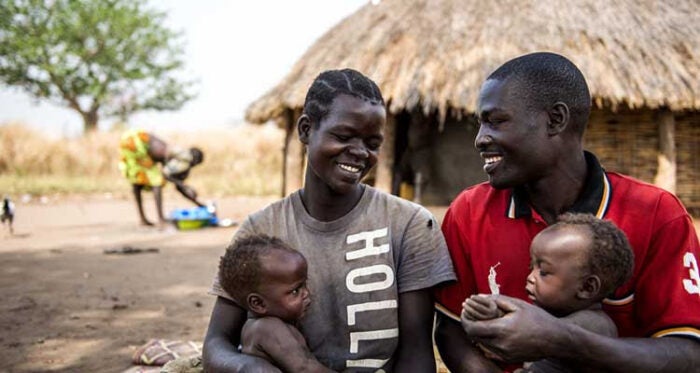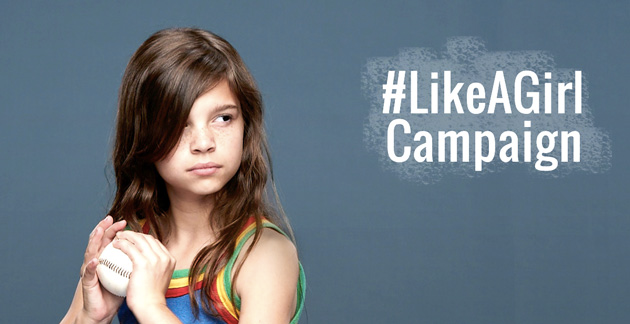The best practices and case studies described in this brief are drawn from our flagship report: “Beijing25AcceleratingProgressForWomenAndGirls.”
“Child marriage protects girls, and it’s our custom.” “Women can’t achieve in STEM fields.”
These are examples of problematic ‘gender norms’ or shared attitudes about appropriate behavior for men and women.
Discriminatory norms and sexist attitudes and biases continue to limit progress for women and girls around the world, from preventing meaningful political participation and access to sexual and reproductive health, to reinforcing unpaid care responsibilities, pay disparities, and job segregation. The good news is it is possible to shift gender norms in a more equitable direction. We highlight promising examples around the world that involve three critical agents of change: male allies, traditional and religious leaders, and advertisers.
ENLISTING THE SUPPORT OF MALE ALLIES
“[Promundo’s] objective is not engaging men. Our objective is a gender-just world. It is about gender equality and gender justice.” –Gary Barker, CEO, Promundo
Enlisting the support of male allies – from political leadership to the household level – is key to changing norms and accelerating progress toward gender equality. Successful approaches encourage community ownership, demonstrate the value of gender equality for the whole community, and involve male role models and champions to sustain lasting change. Here are three promising entry points and examples of what’s working:

1) Promoting community-based interventions and trainings for men to advocate for healthy masculinities, reduce gender-based violence, and demonstrate the benefits of gender equality for all.
- Promundo’s Program H encourages young men to reflect on and shift their perceptions of masculinity and see themselves as co-beneficiaries of progress on gender equality. It includes trainings, public events, posters, door-to-door discussions, and community meetings to help participants develop more gender-equitable attitudes, strengthen communication between couples, and improve norms around caregiving. Program H has been adopted around the world and integrated into schools in Brazil, India, and the Western Balkans, among other areas. The program has also led to meaningful gains; men who participated in Program H report committing fewer acts of intimate partner violence (IPV) and sexual harassment, reduced spread of sexually transmitted diseases, and increased condom use. In the United States, male participants report having more conversations about masculinity with peers and family members, and overall results suggest that young men are eager to further discuss issues of manhood, emotions, and violence.
-
- Additional best practices include:
- SASA!, a community-led program in 25 countries that uses local trainings and advocacy tools to shift men’s attitudes about gender and reduce rates of violence against women.
- Change Starts at Home, an IPV intervention program in Nepal that uses educational radio programs to shift behaviors and norms that perpetrate IPV.
- Zindagii Shoista’s What Works to Prevent Violence against Women and Girls Global Program in Tajikistan, which works to reduce rates of IPV through the economic empowerment of women and household communication skills training.
2) Changing norms around caregiving by encouraging father-specific leave and recognizing and redistributing unpaid care work.
- MenCare+ offers father preparation courses and information campaigns in Brazil, Indonesia, Rwanda, and South Africa to teach fathers about maternal and child health, how to support their wives, and gender equality laws and policies. Such campaigns help overcome fathers’ reported feelings of being unprepared or ill-informed about caring for children, leading to more equal divisions of caregiving in the home.
- Nontransferable, father-specific paid leave legislation, as in Sweden and Canada, can increase takeup and lead fathers to spend more time on housework and care activities, mitigating the gendered burden of unpaid care.
3) Engaging male leaders and role models to accelerate gender equality.
- The World Bank’s entrepreneurial mentorship program in Uganda, through increased exposure and support from influential male role models, encourages women entrepreneurs to enter male-dominated sectors.
- Coalitions like Male Champions of Change and MenEngage help galvanize male leaders across all sectors, including CEOs of major companies, to change organizational cultures and advance more and diverse women in leadership, while making clear that gender equality yields gains for all society.
ENGAGING TRADITIONAL AND RELIGIOUS LEADERS
“It is not easy to end such a deeply entrenched practice like FGC: one that formerly had great value to people. It just didn’t happen overnight.” –Molly Melching, Founder and Creative Director, Tostan
Religious and traditional leaders, who shape community values, are critical agents of change in their communities. When religious leaders use their platform to champion women’s rights, they set a powerful example that can change discriminatory norms at the community level – including challenging religious and traditional values often used to justify harmful practices and violence against women and girls.

Engaging with traditional authorities at grassroots and national levels, backed by systemic reinforcement from national institutions, can elicit widespread support for change.
- The NGO Tostan’s Community Empowerment Programs are a groundbreaking approach that support and empower communities to lead their own sustainable development and promote positive social transformation based on respect of human rights, including abandoning female genital cutting and child/forced marriage. UNICEF estimates that globally at least 200 million women and girls have been subjected to female genital mutilation/cutting – a practice with severe health complications for women and girls entrenched in cultural norms. Originating in Senegal and with programs across West Africa, Tostan’s grassroots training and holistic, multidimensional education programs support community members – particularly men and youth – in raising awareness of female genital cutting and other harmful practices. By tailoring interventions to local contexts, such as using elements of African song and dance in its programming, Tostan builds trust among participants to discuss sensitive issues. To date, 9,000 communities have engaged in Tostan’s programming, and eight countries have issued public declarations abandoning female genital mutilation/ cutting and child marriage.
- Additional best practices include:
- The Strengthening Health Outcomes for Women and Children (SHOW) project with Plan International Canada in Nigeria, which engages religious leaders in trainings to improve maternal, newborn, and child health (MNCH) and sexual and reproductive health and in exploring Quranic support for gender equality.
- The UNFPA and the World Bank’s Sahel Women’s Empowerment initiative in Cameroon, Guinea Conakry, Madagascar, Senegal, the Gambia, and Togo and Berhane Hewan in Burkina Faso, Ethiopia, and Tanzania, encouraging religious leaders to use their platforms to champion women’s rights.
- UNFPA-led “écoles des maris” or “husband schools” in Niger and across West Africa, engage traditional and religious leaders to promote and normalize women’s needs as essential to the community, including the benefits of contraception, family planning, and respect for women and girls.
LEVERAGING MARKETING CAMPAIGNS BY THE PRIVATE SECTOR
“Advertising and communications do shape how people see the world. And when done well, they can spark conversations that lead to changing mindsets about women and girls and how men and boys can engage.” –Allison Tummon Kamphuis, Global Program Leader, Gender Equality & Children’s Safe Drinking Water, Procter & Gamble
Advertisement campaigns by the private sector and others can play a transformative role in advancing gender equality and addressing harmful norms by amplifying women’s voices and promoting messages of equality. Marketing can also influence social norms around women’s engagement in unpaid care and in paid labor opportunities outside the home.

Private sector firms, through their extensive networks and visibility, can promote key messages of gender equality in the media.
- Procter & Gamble has engaged in multiple advertising campaigns with respect to gender equality, societal good, and shared value. Their #WeSeeEqual campaign seeks to leverage their significant voice in advertising and media to tackle gender bias and promote messages of equality. In 2015, “Share the Load” began in India to challenge the norm that laundry was only a woman’s job in the home, looking at the unequal distribution of chores. “Dads Share the Load” in 2016 aimed to tackle the cycle of prejudice in traditional and religious communities and in 2019, “Sons Share the Load” looked at how we raise sons compared to daughters. When the campaign started in 2015, 79% of men in India thought laundry was only a woman’s job. In 2020, that number is down to 41%. The “Like a Girl” campaign encouraged viewers to redefine the harmful notion that to do something “like a girl” was to do it in an unathletic and less skillful manner. Since then, “Like a Girl” has gone from a simple phrase to an empowering media movement for women and girls. Other advertisements working to change harmful stereotypes include anti-racism ads, such as the “Talk About Bias” and “Circumstances,” and campaigns to promote LGBTQ+ inclusion and center people with disabilities.
- The United Kingdom’s Advertising Standards Authority reports provide a key step forward in regulating gender stereotyping in advertising by creating new standards that ban harmful gender depictions, perceptions, and roles.
- The Unstereotype Alliance, a platform of business and industry shapers convened by UN Women, promotes a common vision that aims to eradicate harmful gender-based stereotypes across all its media and advertising content.
Industry leaders should look across all core business operations and functions, including supply chains and distribution networks, to integrate a gender perspective in their work. Encouraging the private sector to promote positive gender norms is a smart business investment. Integrating messages of gender equality and challenging others in the industry to stand up and make a change can accelerate progress at all levels.
THE WAY FORWARD
“These norms transcend generations and they transcend cultures.” –Natalia Kanem, Executive Director, United Nations Population Fund
- We need a concerted, sustained effort to advance progress. Changing discriminatory norms that violate the rights of women and girls and curtail their potential takes slow, steady work, led by community leaders. This includes being accountable to the women’s rights movement by engaging in continuous dialogue and partnerships. A single unconscious bias training or the leadership of one male champion is not enough to undo patriarchy, power structures, and harmful gender norms.
- Partnerships at every level are needed to sustain systemic change, which includes governments taking the lead to advance policy reform. In South Korea, UNFPA worked with the government to change labor laws and employment opportunities for women. This policy reform was a key driver in shifting the norms around son preference and the value of girls.
- Be intentional with language. It is essential to have the support of boys, husbands, and traditional leaders, and this means listening carefully to their concerns, fears, and reservations to women’s rights. Framing issues around improving wellbeing, in alignment with deeper values of health, unity, and family, can make clear the universal benefits of the gender equality agenda.